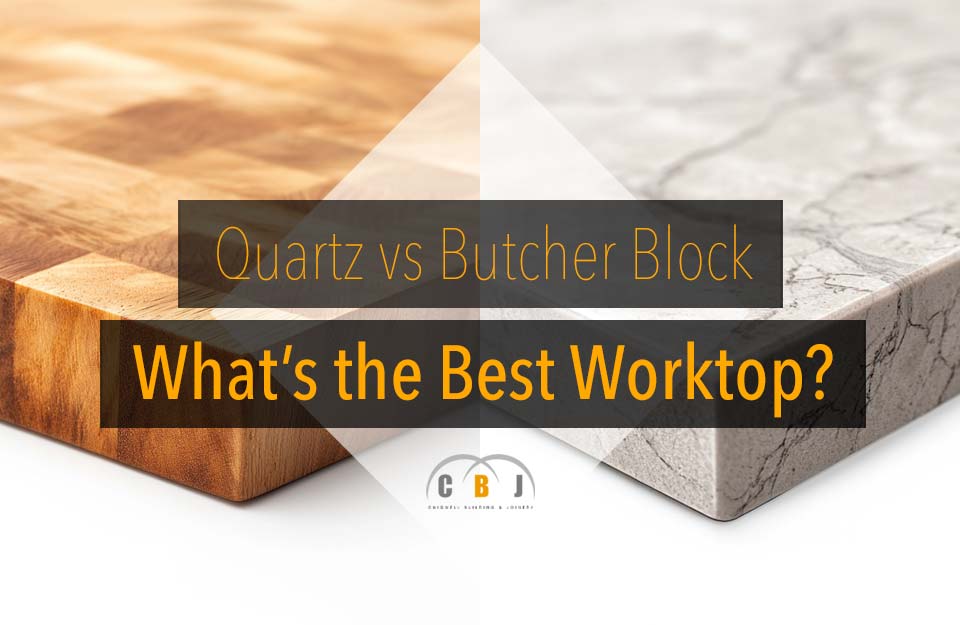
Quartz vs Butcher Block - What's the Best Worktop?
Author Chigwell Building & Joinery
Date 15/04/25
When installing brand new kitchen cabinets, choosing the right worktop is a crucial decision that affects both aesthetics and functionality.
Among the most popular choices are quartz vs butcher block countertops, each offering distinct advantages and challenges.
Whether you're looking for durability, low maintenance, or a warm and natural aesthetic, this guide will help you understand the differences and make an informed decision.
Table of Contents
- What is Butcher Block?
- What is Quartz?
- Origins
- Appearance
- Imperfections
- Durability
- Stain Resistance
- Marks and Scratching
- Maintenance and Care
- Heat Resistance
- Strength
- Longevity
- Water Resistance
- Design
- Installation
- Cost
- Added Value
- Conclusion
What is Butcher Block?
Butcher block countertops are crafted from solid wood, typically made by bonding strips of hardwood such as maple, oak, cherry, or walnut.
This creates a sturdy and visually appealing surface with natural grain patterns and warm tones.
Originally designed for heavy-duty kitchen tasks, butcher block worktops have found their way into modern homes, offering a timeless, rustic charm.
However, as a natural material, wood requires regular maintenance to keep it looking its best and to prevent damage from moisture and wear.
What is Quartz?
Quartz countertops are engineered surfaces made from natural quartz crystals combined with resins and pigments to create a highly durable, non-porous material.
Unlike natural stone, quartz worktops are manufactured to provide a consistent appearance, making them a preferred choice for homeowners seeking a sleek, modern aesthetic.
Available in a wide range of colours and patterns, quartz can mimic the appearance of marble, granite, or other natural stones without the drawbacks of high maintenance.
Origins
The primary distinction between these two materials lies in their composition.
Butcher block is sourced from natural hardwood, while quartz is an engineered material designed for enhanced strength and consistency.
This difference affects everything from durability to maintenance and overall appearance.
Appearance
If you’re drawn to a warm, natural look, butcher block offers a rich, organic aesthetic with unique grain patterns that add character to any kitchen.
Over time, the wood develops a patina, enhancing its charm.
Quartz, on the other hand, provides a sleek and polished finish, ideal for modern and contemporary designs.
With an extensive selection of colours and patterns, quartz allows for greater customisation without the imperfections that come with natural materials.
Imperfections
Because butcher block is made from real wood, it often features natural knots, streaks, and variations in colour.
While many homeowners appreciate these imperfections for their rustic appeal, others may find them less desirable.
Quartz, being a man-made material, is designed to be uniform, free from natural inconsistencies, ensuring a flawless look throughout the surface.
Durability
While both materials are durable, quartz has the upper hand when it comes to resistance against wear and tear.
Its engineered composition makes it highly resistant to scratches, chips, and cracks.
Butcher block, on the other hand, is softer and more susceptible to dents and scratches, though minor damage can often be sanded out and refinished.
Stain Resistance
One of the biggest drawbacks of butcher block is its porosity, making it vulnerable to stains if not properly sealed.
Liquids, particularly oil and wine, can seep into the wood and cause discolouration.
Quartz, being non-porous, is highly resistant to stains and does not require sealing, making it a hassle-free option for busy kitchens.
Marks and Scratching
Unlike quartz, which is highly resistant to scratches, butcher block surfaces can be easily marked by knives and kitchen utensils.
While this may be a drawback for some, others embrace the worn-in look that develops over time.
If you prefer a pristine surface that remains unblemished, quartz is the better choice.
Maintenance and Care
Keeping a butcher block worktop in good condition requires regular oiling and sealing to protect against moisture and stains.
It’s also important to clean up spills immediately to prevent damage.
Quartz, on the other hand, is incredibly low maintenance.
A simple wipe with soap and water is enough to keep it looking pristine, making it a practical choice for those who prefer minimal upkeep.
Heat Resistance
Both materials have limitations when it comes to heat resistance.
While butcher block can withstand moderate heat, prolonged exposure to hot pots and pans can cause scorching or warping.
Quartz, though more resilient, is not entirely heat-proof.
Placing hot cookware directly on the surface can lead to thermal shock and potential damage.
Using trivets or heat pads is recommended for both options.
Strength
Quartz is one of the strongest worktop materials available, offering excellent resistance to impacts and heavy use.
Butcher block, while durable, is more prone to dents and damage from excessive force.
If strength and longevity are top priorities, quartz is the superior option.
Longevity
Both materials can last for decades with proper care.
Butcher block requires periodic refinishing to maintain its appearance, whereas quartz retains its look with minimal effort.
For homeowners seeking a long-lasting, hassle-free solution, quartz is the more practical choice.
Water Resistance
One of the biggest challenges with butcher block is its susceptibility to moisture damage.
If not properly sealed, water can seep into the wood, causing swelling, warping, or even mould growth.
Quartz, being non-porous, is highly resistant to water, making it an ideal choice for kitchens with high moisture levels.
Design
The choice between quartz and butcher block often comes down to personal style.
Butcher block complements traditional, farmhouse, and Scandinavian-inspired kitchens, bringing warmth and texture to the space.
Quartz, on the other hand, offers a contemporary, polished look that works well in modern and minimalist designs.
With quartz, you also have more flexibility in choosing colours and patterns that match your kitchen decor.
Installation
Installing a butcher block worktop requires precision and sealing to prevent moisture absorption.
DIY installation is possible but requires skill, as cutting and sealing must be done carefully.
Quartz installation, however, is best left to professionals due to its weight and the need for specialised tools.
While this adds to the overall cost, professional installation ensures a seamless and durable result.
Cost
Butcher block is generally more affordable than quartz, with prices varying based on the type of wood used.
However, ongoing maintenance costs should be factored in, as regular sealing and refinishing may be necessary.
Quartz, while more expensive upfront, requires little maintenance, making it a cost-effective option in the long run.
Added Value
When considering resale value, quartz typically adds more to a home’s worth due to its durability, low maintenance, and modern appeal.
Butcher block can also enhance a home's aesthetic, particularly in rustic or country-style kitchens, but may not be as universally appealing to potential buyers.
Conclusion
Choosing between quartz and butcher block depends on your priorities and lifestyle.
If you value warmth, natural beauty, and are willing to put in the effort for upkeep, butcher block can be a charming addition to your kitchen.
However, if you prefer a durable, low-maintenance, and modern surface, quartz is the better investment.
Both materials offer unique benefits, so consider how each aligns with your kitchen’s functionality and design before making your decision.

